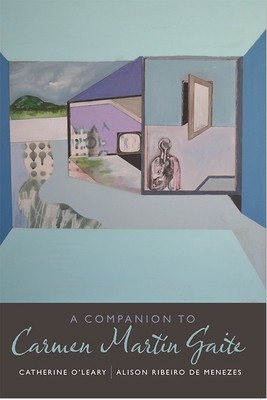
- We will send in 10–14 business days.
- Author: Catherine O'Leary
- Publisher: Tamesis Books
- ISBN-10: 1855662817
- ISBN-13: 9781855662810
- Format: 15.6 x 23.4 x 1.6 cm, minkšti viršeliai
- Language: English
- SAVE -10% with code: EXTRA
Reviews
Description
A comprehensive examination of the full range of Carmen MartÃn Gaite's work.
Carmen MartÃn Gaite produced a large body of work in various genres over the course of her five-decade career, though she is primarily known as a novelist, short story writer, and social commentator. Her work at times reflects, and at times defies, the pattern of development in Spanish fiction since the 1950s. This Companion offers a re-reading of MartÃn Gaite's works, emphasizing her early experimentalism which culminated in mid-career works (notably El cuarto de atrás), and stressing how, in the late 1960s and early 1970s when the majority of Spanish novelists were engaged in a critique of history, MartÃn Gaite turned to the writing of cultural history, exploring its intersection with narrative fiction in a positivist rather than a nihilistic mode. Her exploration of gender issues, particularly mother-child relations, towards the end of her career anticipated new directions in feminist thought. Discussions of often-ignored works, such as poetry, drama, children's literature, and literary translations, offer insight into sidelined aspects of this writer's literary output. Catherine O'Leary is Reader in Spanish at the University of St Andrews. Alison Ribeiro de Menezes is Professor of Spanish at the University of Warwick.EXTRA 10 % discount with code: EXTRA
The promotion ends in 23d.11:01:22
The discount code is valid when purchasing from 10 €. Discounts do not stack.
- Author: Catherine O'Leary
- Publisher: Tamesis Books
- ISBN-10: 1855662817
- ISBN-13: 9781855662810
- Format: 15.6 x 23.4 x 1.6 cm, minkšti viršeliai
- Language: English English
A comprehensive examination of the full range of Carmen MartÃn Gaite's work.
Carmen MartÃn Gaite produced a large body of work in various genres over the course of her five-decade career, though she is primarily known as a novelist, short story writer, and social commentator. Her work at times reflects, and at times defies, the pattern of development in Spanish fiction since the 1950s. This Companion offers a re-reading of MartÃn Gaite's works, emphasizing her early experimentalism which culminated in mid-career works (notably El cuarto de atrás), and stressing how, in the late 1960s and early 1970s when the majority of Spanish novelists were engaged in a critique of history, MartÃn Gaite turned to the writing of cultural history, exploring its intersection with narrative fiction in a positivist rather than a nihilistic mode. Her exploration of gender issues, particularly mother-child relations, towards the end of her career anticipated new directions in feminist thought. Discussions of often-ignored works, such as poetry, drama, children's literature, and literary translations, offer insight into sidelined aspects of this writer's literary output. Catherine O'Leary is Reader in Spanish at the University of St Andrews. Alison Ribeiro de Menezes is Professor of Spanish at the University of Warwick.

Reviews